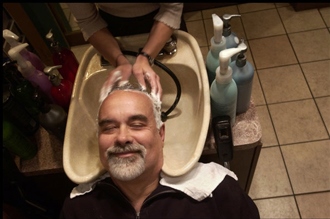Why Shampoo Alone Isn’t the Answer to Hair Loss
In today’s beauty-obsessed society, where luscious locks are considered a symbol of health and vitality, it’s no surprise that countless products claim to combat the woes of hair loss. Shampoo, an everyday staple for most people, has been marketed as a magical solution for those seeking to regrow their thinning hair. However, in this blog post, we will expose the truth behind the notion that ingredients in shampoo can effectively treat hair loss. Brace yourself for a reality check that challenges the prevailing belief system.
Let’s face it—shampoo manufacturers are masters of marketing. They capitalize on people’s desperation and insecurities, promising miraculous results by incorporating ingredients touted as “hair loss fighters.” However, most of these claims are baseless, lacking scientific evidence to support their effectiveness. The truth is, shampoo’s primary purpose is to cleanse the scalp and hair, not to solve complex medical issues like hair loss.
 The root cause of hair loss is often deeper than what a mere shampoo can address. Hair loss can be attributed to various factors such as genetics, hormonal imbalances, nutritional deficiencies, or medical conditions. Expecting a shampoo to cure such complex issues is akin to applying a band-aid to a gaping wound—it simply won’t work.
The root cause of hair loss is often deeper than what a mere shampoo can address. Hair loss can be attributed to various factors such as genetics, hormonal imbalances, nutritional deficiencies, or medical conditions. Expecting a shampoo to cure such complex issues is akin to applying a band-aid to a gaping wound—it simply won’t work.
When reading the labels on shampoo bottles, we often encounter a litany of scientific-sounding ingredients. Manufacturers exploit this confusion to create an illusion of effectiveness. However, the truth is that many of these ingredients are added for cosmetic purposes, such as improving lather, enhancing fragrance, or making the hair appear more voluminous and shiny. They have little to no impact on hair loss treatment.
Consider the brief duration for which shampoo remains in contact with the scalp during a typical hair wash. It is unrealistic to expect that any therapeutic ingredients, even if present in the product, can penetrate the scalp deeply enough to exert any substantial effect on hair follicles. Effective hair loss treatments typically require more prolonged and targeted application to stimulate hair regrowth.
While shampoo can play a role in maintaining scalp and hair health, the idea that its ingredients can effectively treat hair loss is a fallacy perpetuated by clever marketing. Treating hair loss requires a comprehensive approach, addressing the underlying causes with the help of medical professionals and evidence-based treatments. So, let’s free ourselves from the shampoo deception and seek legitimate solutions for the complex issue of hair loss.

